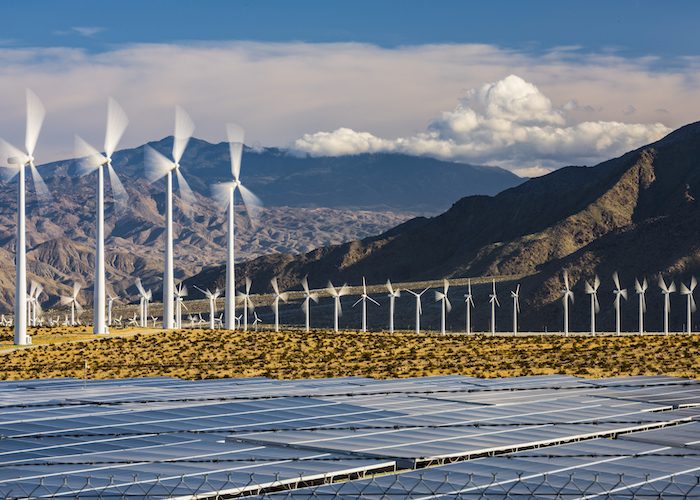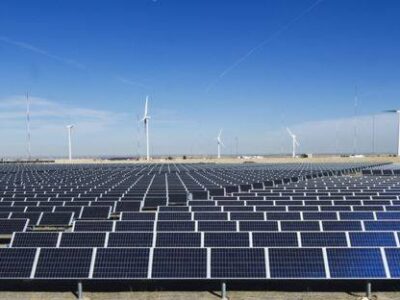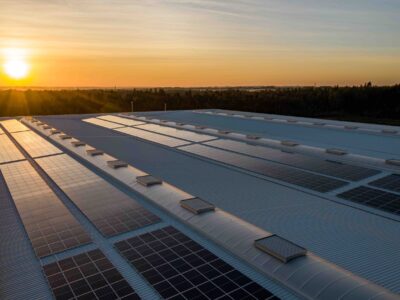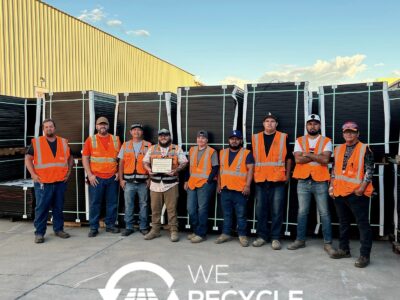Renewable energy is in higher demand than ever. Yet it can be difficult to build the necessary infrastructure. Wind and solar power, although the most popular renewables, still need to be built at least three times faster to meet our current needs. BloombergNEF predicts that over the next 30 years, meeting net-zero goals will require “about 1,400GW of renewables to be deployed every year,” while investment in energy supply and infrastructure will need to double to “somewhere between $3.1 trillion and $5.8 trillion per year.” Unfortunately, the market for clean energy is not always considered accessible. In fact, it is sometimes characterized by complex deal making that only bigger companies have the capacity to maneuver successfully; smaller players can find themselves excluded from a market that would be good for their business and the health of the planet.
This was the status quo, until Bryce Smith, founder and CEO of LevelTen Energy, took matters into his own hands. When it took two years for a power sale to go through at his prior job, he decided to launch an online marketplace that would enable organizations of all sizes to dive into the clean energy markets, help deals in those markets go through faster, and speed up construction of wind and solar technologies. As Smith explained, “we devised a platform that offers clean power in a way that’s far superior, in terms of risk, value, and transaction costs. Imagine if Match.com and Vanguard had a baby that really cared about clean energy.” And the company is set to expand even further; LevelTen recently completed a Series C funding round, with participation from the likes of Google.
Seattle-based LevelTen Energy graduated from the Techstars Seattle Accelerator in 2017 and has become the biggest online space for utility-scale renewable energy transactions. In running multiple marketplaces, it connects providers and developers of renewable energy with interested buyers and their advisors. The LevelTen Energy Marketplace facilitates the execution of purchase power agreements (PPAs).
Currently, more than 4,000 offers to install renewable energy systems and sell the resulting electricity are available from more than 400 developers, and buyers can easily compare PPA offers. This marketplace has led to the creation of more than 1,200 renewable projects in the US, Canada, and 19 European countries, equating to 3.3 GW worth of deals. Plus, LevelTen offers data analytics for PPA selection and performance monitoring for PPAs in users’ portfolios; CFO-Ready Analytics™ calculates more than 1 billion data points each day, providing a complete picture of the value and risks at hand.
Meanwhile, the LevelTen Asset Marketplace, which launched in May, facilitates acquisitions or divestments of physical infrastructure, as well as investment in such structures. Patrick Worrall, Vice President of the Asset Marketplace, explains how LevelTen is leading the charge for change: “It’s hard to imagine getting the best offer for your house, or buying a home you won’t regret if you transact only with the people in your contact list. Yet, selling and buying renewable energy assets used to operate like this.” And because sellers can instantly list their solar and wind assets for auction, buyers and investors get transparent insight. Through such marketplaces and data management capabilities, LevelTen has already begun to hammer away at the problems plaguing renewable energy transactions.
It is no wonder that the company’s recent Series C funding round raised $35 million, increasing total funding to $62.3 million, as LevelTen announced on August 25. The round was led by NGP ETP, with participation from My Climate Journey (MCJ) Collective and many of LevelTen’s existing investors. Most notably, Google contributed to the round, in line with its goal of carbon-free energy, 100 percent of the time by 2030.
Smith told the Seattle Times that “our partnership with Google is new, and we’re very excited about working together.” Part of Google’s interest may stem from LevelTen’s exploration of complex storage energy agreements, allowing storage to be added to PPA portfolios. Their corporate partnerships don’t stop there. Last year, Starbucks teamed up with LevelTen to become the first corporation to implement this financial agreement. Smith informed Canary Media that “storage is going to be so central to that 24/7 load-matching challenge that is also part of our product roadmap here. That’s obviously a high priority for Google, and it’s one of the reasons they’re invested.”
The funding will be used to expand the platform, and get “these products in the hands of newer and smaller buyers, not just the Googles of the world,” Smith told Canary Media. Additionally, LevelTen has come up with innovative ways for software to accelerate the clean energy transition; in particular, LevelTen plans to invest in “real-time load matching technology (24/7), project developer services, environmental and social justice scoring systems, and more advanced power purchase agreement (PPA) products.” Some of the funding will also be used to obtain a bigger Seattle office, expand the smaller Madrid office, and hire more employees. In the words of Smith, “renewable transactions will surely become as customary and as efficient as fossil fuel transactions, and we’re intent on improving our platform until that happens.”





